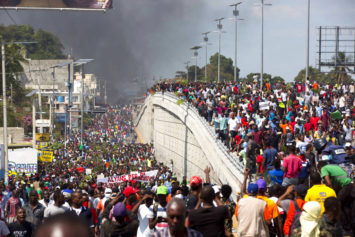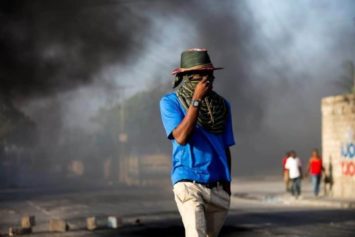Update: At least three Haitians were reported dead; a woman and a child in Souvenance and a 10-year-old girl in Thomazeau. Thousands were evacuated because of flooding.
Tropical Storm Isaac lashed Haiti today, amid severe worries among Haitian officials and relief workers that the island, still devastated from the earthquake two years ago, would not be able to adequately handle the onslaught.
Thousands of people remain homeless on the island, living in makeshift tents that leave them vulnerable to the torrential downpour that Isaac brought to the southern coast and the capital of Port-au-Prince.
There were no reports of fatalities, but inspection for damage was still under way as the sun rose. As night turned to day in the capital, Haitian radio reported floods and mudslides.
In Jacmel, on the southern coast of Haiti, power was out, and heavy rain and strong winds persisted into the morning hours. Damage to trees and houses was visible, and there was little movement on the streets.
Forecasters expected the storm to hit Cuba today before it strengthens into a hurricane, leaving the Caribbean and heading toward the Florida Keys and the Gulf of Mexico.
Hurricane warnings were issued for the west coast of Florida.
Early Saturday, the U.S. National Hurricane Center said the center of Isaac was 95 miles southeast of Guantanamo Bay, Cuba.
In Port-au-Prince, more than 350,000 earthquake survivors still live in open tents—a testament to the poverty of the nation and the lack of adequate housing that has been rebuilt.
Haitian residents have grown so accustomed to their imperiled state that they seemed to consider disaster almost inevitable as the storm approached.
“We live under tents. If there’s too much rain and wind, water comes in. There’s nothing we can do,” Nicholas Absolouis, an unemployed 34-year-old mechanic at one camp for homeless people, told Reuters.
“There are still too many people living in the camps. There’s a good chance that those might be destroyed with the passage of the cyclone,” said France Hurtubise of the International Federation of Red Cross and Red Crescent Societies in Haiti.
Because so much of the country has lost its forestation, a major concern in the aftermath of the storm was flash flooding and mudslides.
The government tried to evacuate thousands of tent camp dwellers, but the task wasn’t easy as many chose to stay in their makeshift homes to protect the possessions they have managed to accumulate.
“There’s a lot of people who are resisting because they are scared of losing what little they have now,” aid Bradley Mellicker, head of disaster management for the International Organization for Migration (IOM).
The government’s Civil Protection office sent about 3,000 volunteers across Haiti, warning people about flood and landslide risks. About 1,250 shelters—schools, churches or other community buildings—opened their doors to house people seeking refuge from the storm.
But Red Cross officials said the number of shelters could be grossly inadequate and Prime Minister Laurent Lamothe acknowledged Haiti had “limited means” to ensure public safety.
Red Cross and IOM representatives joined government officials in trying to evacuate 8,000 of the “most vulnerable people,” including 2,500 sick and disabled, from 18 tent camps in low-lying coastal areas of Port-au-Prince.
And once the storm leaves and the nation is drenched in standing water, there is the fear that the cholera epidemic would return. More than 7,500 people have died since the disease first appeared in October 2010.
In Tampa, Republican Party officials vow their convention will go on as planned, even Isaac forces them to change parts of the schedule. National Hurricane Center meteorologist Rick Danielson said late on Friday that Tampa could be hit by coastal flooding and driving winds or rain.
“There is still a full range of possible impacts on Tampa at this point,” he said.


